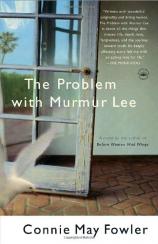Reading Group Guide
Discussion Questions
The Problem with Murmur Lee

1. On the frontispiece is a quote from John Berger: "There is never a single approach to something remembered." What does that mean, in terms of this novel? Why do you think Connie May Fowler chose that quote? Discuss Fowler's use of multiple narrators and multiple perspectives, and especially Murmur Lee as narrator after death.
2. Aside from the first-person narration of the characters themselves, Fowler also intersperses written ephemera --- diary entries, a shopping list, a note passed during childhood. What purpose do these scraps serve to the progression of the story, and our understanding of Murmur Lee?
3. Murmur Lee describes herself on page 9 as "the lover to many men, a good friend to a well-chosen few, a daughter who'd been secretly wild but openly obedient, a mother who'd never stopped viciously mourning the loss of her only child, a woman who despite some tough breaks and lapses in judgment had made her own way in the world." Is this an accurate description? Compare it to the "lessons I've learned since dying," on pages 162 and 163. How has Murmur Lee's perspective on herself changed?
4. Birds appear over and over throughout the novel, from a swan feather on the first page to a seagull on the last. Why? What do the various bird images mean to you?
5. Murmur Lee is a witch, and her status is presented very matter-of-factly throughout the book. Why do you think she began to practice witchcraft? Did it have anything to do with her religious upbringing? Do you believe in the power of spells?
6. Discuss Murmur Lee's experience with childhood religious visions. As she says on page 73: "How astounding to be the focus of my mother's ecstatic passion, how bone-breaking delicious to be the object of her approval!" How much of Murmur Lee's seizures do you attribute to medical causes, and how much to the desire to please her mother? What effect did they have on her as an adult, aside from the obvious one?
7. Charlee Mudd left the South behind, hoping to transform herself into a Northerner. Was she successful? In what ways did she fail? And what about the novel itself --- would you consider it a "Southern" novel?
8. The circumstances of Murmur Lee's death are questioned and discussed throughout the novel, and the truth is revealed only at the end. Does that make this a mystery? How does the novel fit into the conventions of classic mystery writing, and how does it break them?
9. According to Murmur Lee, her great-great-grandfather named their island Iris Haven after the Greek goddess of the rainbow, but without realizing that Iris also "had one hell of a job: She received the souls of dying women." Murmur Lee asks, "Did his ignorant foray into the world of nomenclature curse this place? Is that why we keep dying out here, again and again, so young?" (pg 32) What do you think of Murmur Lee's assessment of the situation? Is it possible for a name to curse a place like that?
10. Murmur Lee didn't know that she was the product of a rape until after her own death. In what ways did it affect her while she was still living?
11. Compare and contrast Zachary's behavior while Katrina was dying with Erik's during Blossom's illness. Do you see a parallel? Does Murmur Lee's compassion for Zachary result from her own experience with Erik?
12. On page 120 Charlee wonders about Murmur Lee's will: "Did she know her time was up? Had she made a decision --- watery and vague, but a decision nonetheless --- that she'd best set her affairs in order? How does a healthy thirty-five-year-old woman come by that sort of precognition?" How would you answer those questions? Does the existence of a relatively young woman's will indicate a subconscious readiness to die?
13. After Murmur Lee has sex with Billy for the first time, she asks him if he loves his mother; he replies that he was happy when she died. Murmur Lee is tremendously upset by his response, recognizing an old pattern of hers. What is the significance of this? If Murmur Lee hadn't died, do you believe she and Billy would have ended up together? Why, or why not?
14. Discuss the characters of Lucinda Smith, Edith Piaf, and Ariela van den Berg. What purpose(s) do they serve in the novel?
15. Why does Zachary punch Billy?
16. Throughout the novel there are countless references to ghosts, and wind. After death, in fact, Murmur Lee is surrounded by gusts and flows. What do you think this means? What do you think happens to us after death?
17. What does the title mean? What is the problem with Murmur Lee?
The Problem with Murmur Lee
- Publication Date: March 7, 2006
- Paperback: 288 pages
- Publisher: Broadway
- ISBN-10: 0767921453
- ISBN-13: 9780767921459








